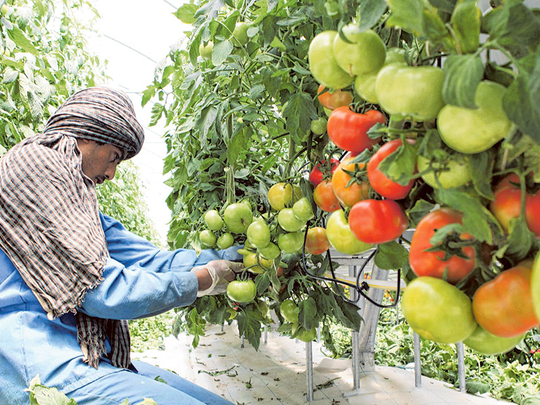
Abu Dhabi: Abu Dhabi emirate’s efforts to improve vegetable and fruit production are showing tangible results.
According to estimates, Abu Dhabi farmers will produce over 38,800 tonnes of quality produce during the 2014-2015 farming season, said a spokesperson of the Abu Dhabi Farmers Service Centre (ADFSC). The value of locally produced vegetables and fruits is expected to grow by around 25 per cent this year, compared with 2013. ADFSC is an Abu Dhabi government organisation tasked with improving the farming sector in the emirate.
This is up from 28,500 tonnes in the 2013-2014 season. The value of the local produce is estimated to grow to over Dh65 million in 2014, up from Dh52 million in 2013, according to the production plan made by ADFSC.
Abu Dhabi’s agriculture sector is generating just one per cent of GDP (Gross Domestic Product) and less than 15 per cent of the fruits and vegetables available in local markets annually, according to a report published by the Environment Agency-Abu Dhabi (EAD).
However, the share of local produce is gradually growing, the ADFSC spokesman said.
This upward trend emerged since 2011 as ADFSC formed partnerships with major retailers throughout the UAE. The business grew from 20 million kilograms of produce in 2011 to around 40 million kilograms of produce during the 2013-2014 season, the spokesman said.
The centre started selling local meat and chicken through its own souqs across the emirate in 2012, and through major retail chains in 2013. The products include local fresh sheep, goats, calves, and poultry sourced directly from Abu Dhabi farms. Supplying other types of white meat, including rabbit meat, quail, and pigeons raised in Abu Dhabi farms, is also on the cards.
These partnerships boost the earning potential of each farmer who benefits from the support mechanism that he would not otherwise have achieved on his own.
This also promotes buying local products that reduce the carbon footprint of foods we eat. Making the switch to locally produced food minimises the carbon footprint caused by transportation.
Carbon footprint is the amount of carbon dioxide or other carbon compounds released into the atmosphere as a result of the activities of a particular individual, organisation, or community. Food transportation contributes a huge amount of carbon emissions worldwide.








